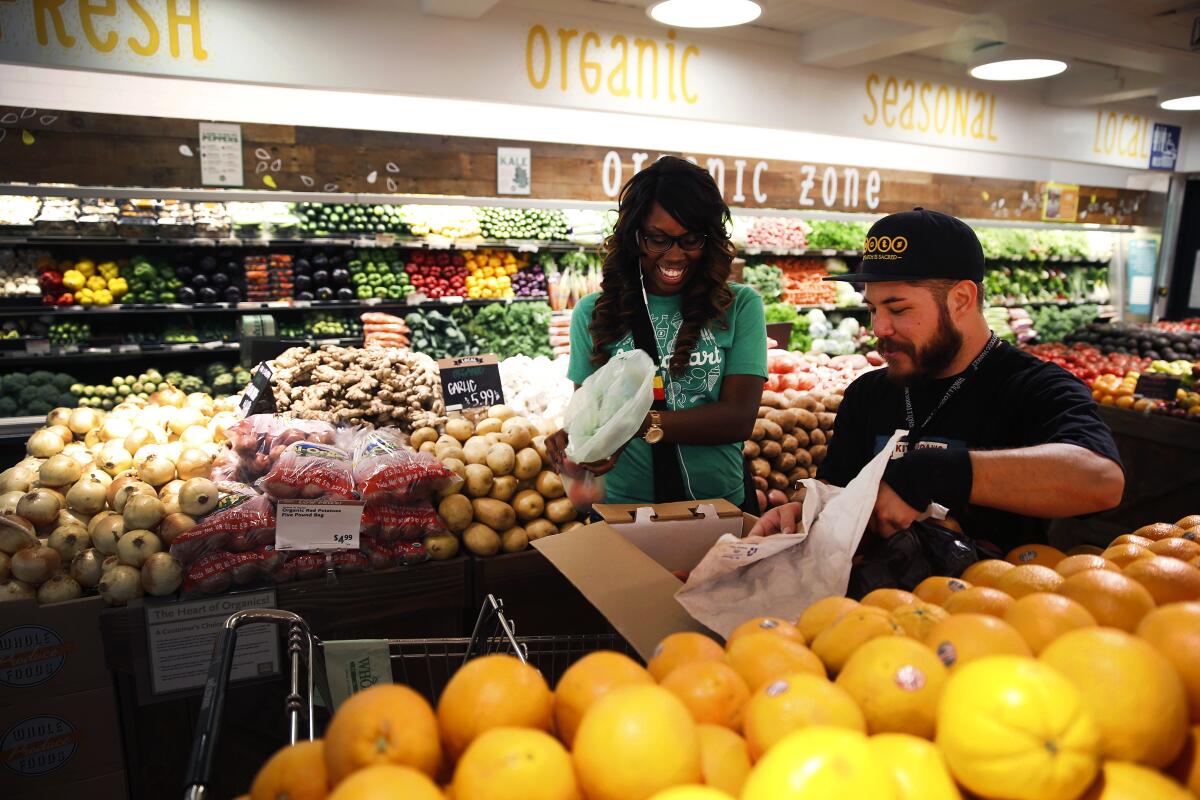Jobs for people who love to shop

- Share via
Do you love to shop? If you want to connect your passion with some pay, you can sign up with companies that will compensate you for shopping for others.
Between grocery shopping apps and those that ask you to evaluate the user experience when shopping for shoes, salons, or services, people who love to shop have plenty of ways to make money at it.
Grocery shopping
If grocery shopping is your bag, you have four options: Instacart, Shipt, Dumpling and TaskRabbit.
Instacart is the market leader in this space, which means it has the most jobs available in the most cities. It also offers two different types of gigs — an in-store shopper, who does no deliveries and is an employee; and a “full-service shopper.” Full-service shoppers are independent contractors, who use their own cars, insurance and gas and are paid by the gig.
In-store shoppers will earn at least minimum wage and can be scheduled for up to 29 hours a week. These individuals shop for and package orders, which will be picked up by delivery drivers.
Consider these side hustles an alternative to playing Sudoku or Solitaire. They’re a breeze to sign up for and easy to do — but there is a privacy cost.
Full-service shoppers work whenever they choose to. When they sign onto the app, it alerts them to pending orders, which they can decide to fill or skip. The order has information about where and what you’re shopping for and how much the order pays. Drivers also can get tips, which Instacart encourages but does not require.
Theoretically, in-store shoppers earn less per hour. However, after accounting for taxes, insurance, gas and other expenses, pay is likely to work out to just over minimum wage for “full-service” independent contractors, too.
Shipt works almost identically to the full-service shopper option at Instacart. Shoppers are independent contractors, paid by the job and through tips. Experts estimate that Shipt shoppers earn about $17 per hour, before expenses.
Dumpling and TaskRabbit operate differently. These sites put freelancers in charge of determining when they shop, where they shop and how much they charge. Customers contact the freelancer directly.
Although both sites work better for freelance shoppers with established clients, neither site has shopping contracts with retailers. So you’re less likely to have someone who doesn’t know you enlist your services.
For this reason, many people who shop for groceries through Dumpling and TaskRabbit also sign up with Shipt and Instacart. That helps them establish personal contacts with people who regularly want groceries delivered, which puts them in a better position to nab new clients.
Mystery shopping
Mystery shoppers go incognito to stores and restaurants to evaluate the products and services offered there. These jobs often pay poorly, but sometimes provide access to free meals and services, such as massages and eyebrow sculpting.
Before the pandemic, these jobs involved a lot of work for a scant amount of pay. However, we’re increasingly seeing mystery shopping firms offering “bonus” pay to get shoppers interested. Still, most mystery shopping jobs require that you pay close attention to a litany of rules and requirements of the shop and write a detailed report. Even with bonus pay, when you calculate in drive time, shopping time and report time, these jobs barely generate minimum wage.
The best advice here is to take only jobs that you like and that are highly convenient to where you live. Otherwise, you’ll spend more on gas than you’ll get back from the gig.
Finding mystery shopping gigs
Where can you find mystery shopping jobs? The two sites that we recommend are BestMark and SecretShopper. You can find out more about them by clicking on their names above to get to our reviews. There are other mystery shopping companies, including A Closer Look, MarketForce and Certified Field Associates. But we urge you to steer clear of them, mainly because freelancers say they often deny payment for completed work or pay too little to cover the cost of the shop.
Video product reviews
One other idea you might like: ProductTube pays freelancers to do short video reviews of products and services. You film a two- to five-minute review on your phone and earn anywhere from $5 to $35. Recently, we’ve seen gigs paying up to $100 for batches of reviews that would require going to several different stores.
Kristof is the editor of SideHusl.com, an independent website that reviews moneymaking opportunities in the gig economy.
More to Read
Inside the business of entertainment
The Wide Shot brings you news, analysis and insights on everything from streaming wars to production — and what it all means for the future.
You may occasionally receive promotional content from the Los Angeles Times.











